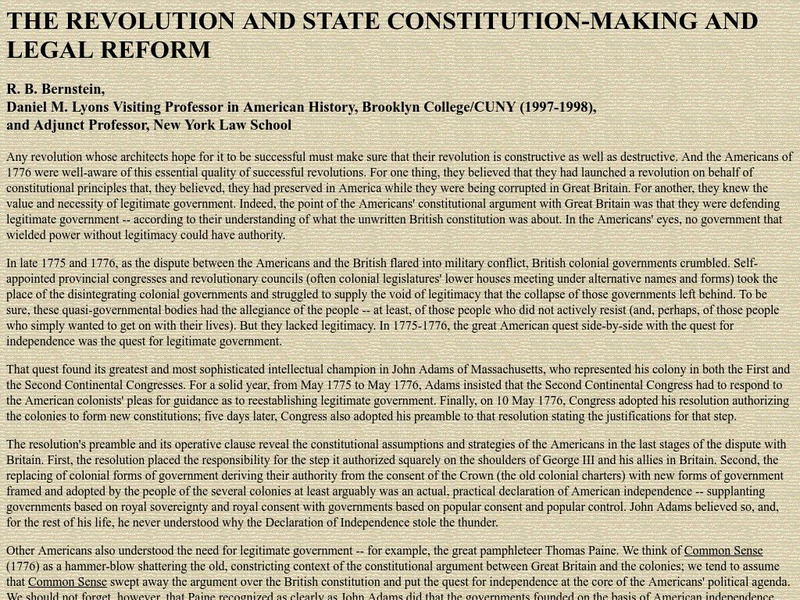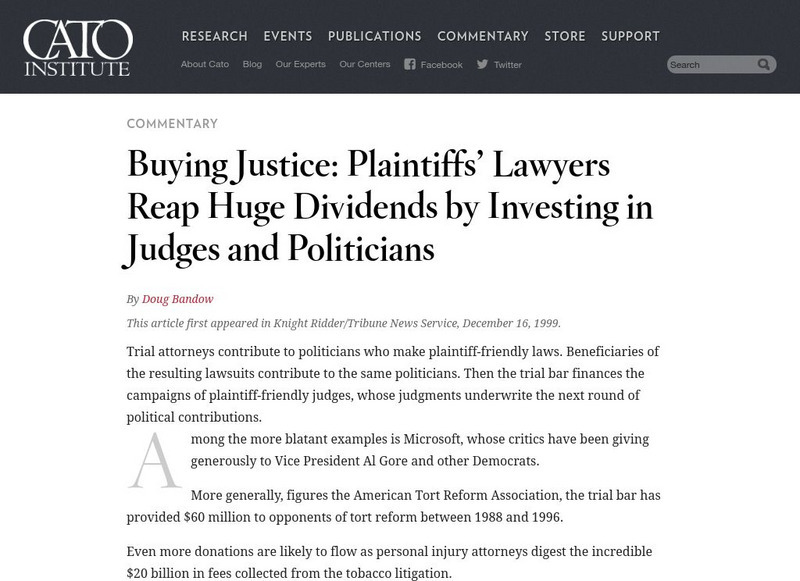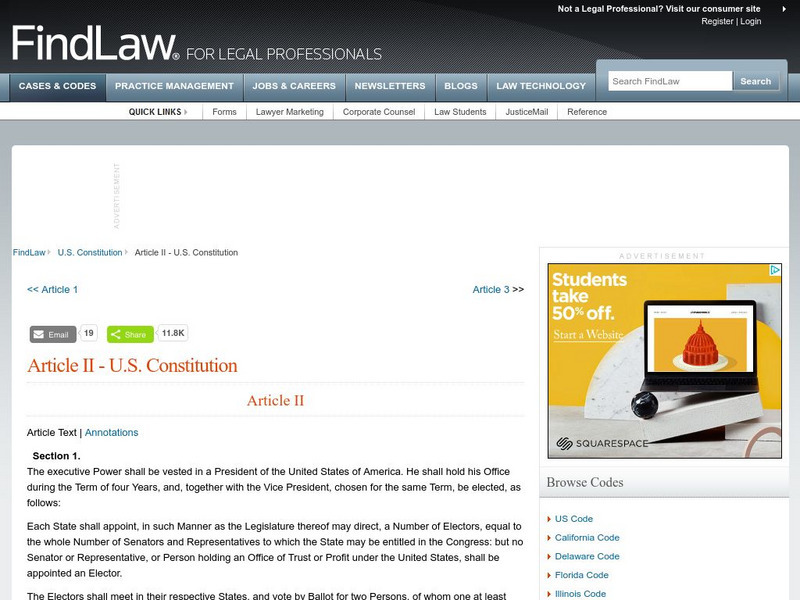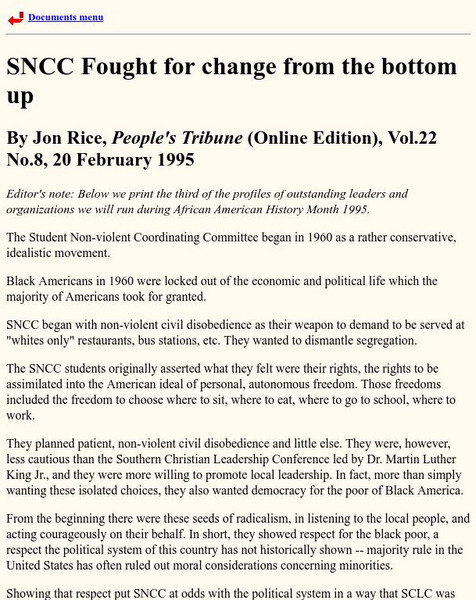Hi, what do you want to do?
iCivics
I Civics: State Power: Got a Reservation?
Students discover that states have their own governments and powers separate from the federal government. They learn what those powers are, how they're different from the federal government's powers, and that state governments also give...
Michigan State University
Michigan State University: American Revolution: Revolution and State Constitution Making
A full-length essay on the formation of new state constitutions by the 13 newly independent states.
iCivics
I Civics: Constitutional Principles
The Founding Fathers created a government based on a set of fundamental principles carefully designed to guarantee liberty. This lesson lets young scholars look at the Constitution from the perspective of its foundational principles and...
PBS
Pbs Learning Media: The Powers of Government
Students learn how the three branches of the United States government work together and the powers that the Constitution assigns to each branch-legislative, executive, and judicial.
US Government Publishing Office
Ben's Guide to u.s. Government: Branches of Government
Students will visualize how the Constitution organized our 3 branches of government and the role each plays in our government. This infographic breaks down the powers of each branch and shows how they perform checks on the other...
Siteseen
Siteseen: Government and Constitution: Branches of Government
This article contains a useful guide to the functions of the three US Branches of Government that make, enforce, or interprets laws.
Bill of Rights Institute
Bill of Rights Institute: Constitutional Principles
James Madison knew that a key challenge of maintaining just government was framing it in such a way that the government would be forced to control itself. How does a system of separated powers-and the checks and balances built into those...
US Government Publishing Office
Ben's Guide to u.s. Government: Learning Adventures: Branches of Government
Introduction to a learning adventure on the Constitution and branches of government. Students click on their age group icon to find information on which part of the Constitution spells out the powers of legislative, executive and...
PBS
Wnet: Thirteen: The Supreme Court: Landmark Cases: Schechter v. u.s. (1935)
PBS provides details on the landmark Supreme Court case of Schechter v. U.S. which dealt with congressional powers under the Commerce Clause.
Bill of Rights Institute
Bill of Rights Institute: Constitution of the United States of America (1787)
The Constitution was written in the summer of 1787 in Philadelphia, Pennsylvania, by delegates from 12 states, in order to replace the Articles of Confederation with a new form of government. It created a federal system with a national...
Independence Hall Association
U.s. History: The Antifederalists' Victory in Defeat
By 1788 eleven states ratified the Constitution, more than enough to put it into effect as the document establishing rules for the nation. Read about the goals of the Federalists in estabilishing a national government and find out how...
Harry S. Truman Library and Museum
Harry S. Truman Library & Museum: Checks and Balances
Descriptions of the separate powers and functions of the three branches of the federal government. Site explains how the powers of one branch check and balance those of another.
ClassFlow
Class Flow: Challenges Faced by the New Nation
[Free Registration/Login Required] This unit covers the content area featuring the challenges faced by the new nation including the writing of the Constitution, government powers, the Bill of Rights and the War of 1812.
Digital History
Digital History: Compromises
Compromise was the name of the game when writing the Constitution. See how taxation, elections, and the power of the federal government were enshrined in the document. Marvel at the ideas that were rejected.
Cato Institute
Buying Justice: Plaintiffs' Lawyers Reap Huge Dividends
This writer discusses the buying of justices' impartiality by trial lawyers and calls for tort reform.
Ohio Test Prep
Ohio Test Prep: Module 3: Government
Learning module on American Government prepares students to take the Ohio state tests in Social Studies on topics including Laws, U.S. Constitution, Rights and Responsibilities, Framework of Government, and Separation of Powers. Includes...
Other
Plimouth Plantation: Thanksgiving Interactive: You Are the Historian
This site, developed by Plimoth Plantation, offers visitors the chance to use the skills of historians to peel away the layers of myth and misconception surrounding "The First Thanksgiving" and discover what might really have happened...
Illinois Institute of Technology
Oyez: Schechter Poultry Corp. V. United States (1935)
This U.S. Supreme Court case declared the National Industrial Recovery Act (NIRA) of the New Deal illegal because of the issue of separation of powers. The 'Case Basics' links have documents and more information from the court case.
Thomson Reuters
Find Law: United States Constitution: Article Ii
Full text of Article II from the U.S. Constitution, as well as detailed annotations that explain the reasoning and subsequent impact of each clause and section of the Article. Content explores everything from the nature and scope of...
A&E Television
History.com: Black History Milestones
A detailed account of the history of African Americans is presented in this article. Divided by main topics or periods of time, the coming of slavery to America is the first focus. Followed by plantation life and escapes to freedom and...
Schools of California Online Resources for Education
Score: The u.s. Constitution Power Grab Game
Politicians like power, but who actually gets to use their powers in different situations? Take this quiz to sort out the checks and balances that are used on the various power plays.
Hartford Web Publishing
World History Archives: Sncc Fought for Change From the Bottom Up
A highly informative narrative on the development and philosophy of the Student Nonviolent Coordinating Committee, with comparisons to Dr. King's SCLC and the Black Panther Party. Good resource.
iCivics
I Civics: Limiting Government
Explore the five basic limits on government through the true story of Peruvian president Alberto Fujimori, and other fictional cases of government power gone wild.
iCivics
I Civics: Montesquieu Mini Lesson
Meet the Baron de Montesquieu, one of the great thinkers of the 18th century. He spent a lot of time thinking about how governments should be created and maintained. These ideas guided the Founding Fathers when they wrote the...



















